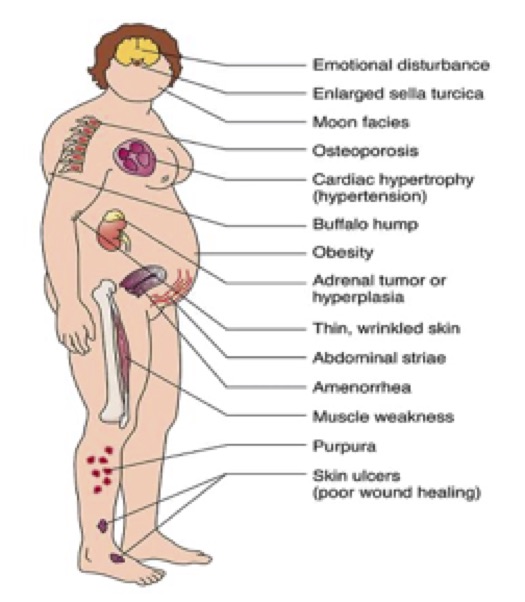What is Cushing’s syndrome?
The condition of cortisol excess is called Cushing’s syndrome. It can be due to excess secretion of cortisol either due to a problem in adrenal gland itself or due to excess secretion of ACTH, the Pituitary hormone that controls cortisol secretion.
In some rare occasion, ACTH can come from tumours from another part of the body, benign or malignant. However, the most common reason being the condition called iatrogenic Cushing’s which is caused due to excess intake of steroid drugs for some reason like allergy, asthma or chemotherapy.

Common signs and symptoms involve progressive weight gain and skin changes, such as:
- Weight gain and fatty tissue deposits, particularly around the midsection and upper back, in the face (moon face), and between the shoulders (buffalo hump)
- Pink or purple stretch marks (striae) on the skin of the abdomen, thighs, breasts and arms
- Thinning, fragile skin that bruises easily
- Slow healing of cuts, insect bites and infections
- Acne
How is Cushing Syndrome diagnosed?
Blood tests:
- Blood cortisol in the morning and mid-night and after giving tablet called Dexamethasone.
- Estimation of ACTH value helps to find the source of excess steroid.
Urine tests:
- 24 hour urinary cortisol excretion
Imaging tests. Computerized tomography (CT) scans or magnetic resonance imaging (MRI) scans can provide an image of pituitary and adrenal glands to locate abnormalities, such as tumours.
Cushing Syndrome Treatment
Treatments for Cushing syndrome are designed to lower the high level of cortisol in your body. The best treatment for you depends on the cause of the syndrome. Treatment options include:
- Surgery: Removal of the tumours.
- Radiation therapy: If the surgeon can’t totally remove a pituitary tumor, radiation therapy to be used in conjunction with the operation. Additionally, radiation may be used for people who aren’t suitable candidates for surgery. Radiation can be given in small doses over a six-week period, or with a technique called stereotactic radiosurgery (Gamma Knife surgery).
Medications: Medications can be used to control cortisol production when surgery and radiation don’t work or making the patient ready for operation. Medications to control excessive production of cortisol at the adrenal gland include ketoconazole (Nizoral), mitotane (Lysodren) and metyrapone.
What follow up is needed?
Whatever the source or treatment, patients with Cushing’s syndrome should be followed up by Endocrinologist lifelong. Your Doctor will tell how often and what tests are to be done.
Also see,